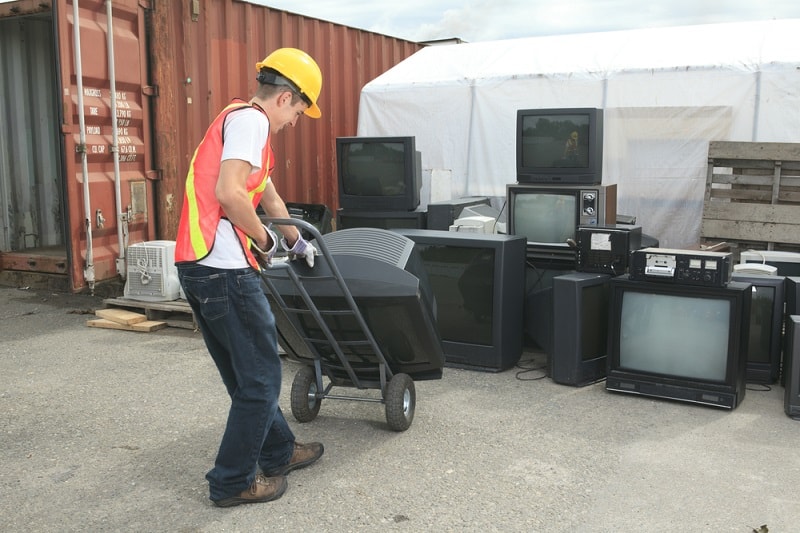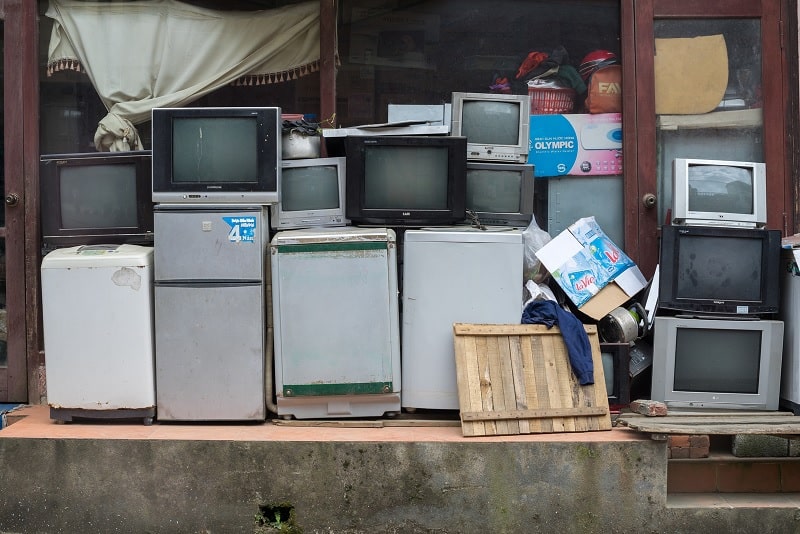If you have an old TV that you would like to get rid of, you shouldn’t just put it in out with the rubbish. Putting televisions in the rubbish bin is illegal in many areas of the U.K.
TVs, computer monitors and other electrical appliances fall under waste electrical and electronic equipment regulations.
Old TVs contain harmful, toxic substances classified as hazardous waste. These substances can leach into soils and water when they are dumped into landfills. These toxins can create health hazards for people, animals and plants.
On the positive side, many components and materials of televisions are recyclable, which reuses rare or valuable substances.
Recycling, reusing and repurposing help the environment in several ways. Read on for environmentally friendly ideas about how to dispose of your old TV in the U.K.
1. Give It Away
Reusing and repurposing old appliances is a good alternative to throwing them away.
The easiest is to give your old TV to someone you know. Ask your friends, family and acquaintances if they would like an extra TV.
Freecycle connects people who want to give things away with those looking for things.
Even if it isn’t working, your old TV may contain parts that someone needs to keep theirs working.
Whatever the need, Freecycle lists both giveaways and people looking for items.
Although you need to register, you can personalise your membership and set up your own circle of friends to give, lend and receive items.
2. Donate It
There are several ways to donate to worthwhile organisations that receive both working and non-working TVs.
If your telly is working, investigate charities in your area that accept donations of electronic equipment.
There is no cost to you to donate, and your donation helps earn money for the receiving organisation.
Although many charities ask donors to bring the item to a drop-off point, some collect large items from your home if you book in advance. Call and ask about their policies.
Some organisations refurbish non-working appliances. Some use them as training tools for vocational training.
Many charities repair and sell them through their charity shops. Others only accept working appliances.
Hospices, women’s shelters, homeless charities and other service organisations may welcome working TVs.
The Reuse Network work with charities, businesses and social service organisations throughout the U.K., receiving donations of household items and passing them on.
TVs and other items may be given to low-income families or used as materials for training programs. The organisation is committed to reducing waste, repurposing equipment and helping others.
3. Sell Your Old Telly
Selling is another way to reuse a working television. Although you may not want a technologically outdated TV, others may find it suits their needs.
Gamers are often on the lookout for CRT-style televisions that work with old generation games.
Students often look for affordably priced older models. In other instances, large households or low-income families may appreciate access to an inexpensive TV.
Several internet sites list items for sale without charging a fee, including Facebook Marketplace and Gumtree. Both are popular for sellers offering bulky items, including TVs. Other online platforms, such as eBay, charge a fee for listings.
The key to a successful, quick sale is to give as much information as possible about the item, including photos or videos.
Give an honest assessment of the condition, such as “no remote”. Set a realistic price that reflects its condition and age.
Negotiate the transfer with the buyer. Some buyers may be willing to pick it up or meet at a neutral place to complete the transaction.
4. Recycle Through Your Local Council or a Recycling Organisation
Recycling is an environmentally responsible way to dispose of old TVs. It redirects waste away from landfills, extracts hazardous materials that harm the environment and recovers rare and valuable materials that can be reused.
Toxic materials are disposed of responsibly. Recovery of rare materials reduces waste, reduces production costs and conserves natural resources.
Local Council Tips
Most local councils operate tips that take electronics. Call your local council, or put your postcode in the recycling centre finder tool here to find out what they take and their collection policy.
Often, you will have to bear the cost of taking it to the tip. However, some offer kerb pickup if the item is bagged and tagged according to their guidelines.
Recycling Companies
Many recycling companies throughout the UK accept TVs and other electronic devices.
Privately run recycling centres are licensed and know how to responsibly dispose of materials found in TVs.
Analogue and early-model flat-screen TVs contain a wide range of hazardous materials, including:
- Mercury
- Lead
- Beryllium
- Cadmium
- Bisphenol A (BPA)
- Flame retardants
These substances are extracted and disposed of according to national and local regulations with the goal of creating the least impact to the environment.
Old televisions also contain useful substances that can be recycled and reused in the manufacturing of new appliances, including:
- Gold
- Copper
- Plastics
- Metals
- Glass

Trade-In Old TVs for New
New Electrical Retailer Take-Back rules make recycling easier. Retailers across the UK now accept old TVs for recycling when you buy a new one, even if you did not purchase the old one at that store.
The shop that receives the items routes them to recycling centres. Thousands of drop-off centres are being set up to receive goods. Because TVs are bulky, it is best to find out ahead of time where yours can be dropped off.
Many manufacturers accept trade-ins of old TVs when you buy a new one. Ask whether a company will remove an old television when they deliver a new one.
A few places, such as CEX and Zarax, buy and sell used TVs or offer in-store credits.
Some major manufacturers, such as Samsung, have trade-in policies for old TVs as part of their environmental initiatives.
Positive Impacts of Recycling
The efforts of each individual add up to a large effect in maintaining a healthy environment and reducing landfill waste.
Thrown-away electronics are becoming one of the largest sources of waste in the UK and worldwide. Your small contribution to recycling, refurbishing and reusing helps keep the environment clean.
The easiest way to get started with recycling for your home or business is to do a simple internet search to find out what options are available in your area. You can also call your local council about recycling efforts in your area.

Naturaler is a UK website full of tips and recommendations for living a more eco-friendly, chemical-free and natural lifestyle.



